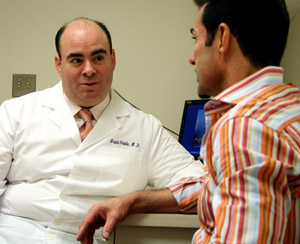Northwestern Ranks Second in HIV/AIDS Research Impact
 |
| Dr. Frank Palella talks with a patient. |
The highly regarded journal, Science, identified Northwestern University as one of the top 10 institutions with the highest impact on HIV/AIDS research based on citations per published paper. Northwestern’s own Frank J. Palella, MD, associate professor of medicine, holds the distinction of authoring the single most-cited paper. His “Declining Morbidity and Mortality among Patients with Advanced Human Immunodeficincy Virus Infection,” published in the New England Journal of Medicine (NEJM) in 1998 reported that potent effects of anti-HIV cocktails led to a steep decline in disease and death in the U.S.
In its July 24, 2008 special issue “HIV/AIDS: Money Matters,” Science, with help from the Thomson Reuter’s Institute for Scientific Information, assessed the impact of more than 120,000 HIV/AIDS-related papers published between 1998 and 2007. Researchers who had the most citations per paper, with a minimum of 100 publications, were deemed as having had the most impact.
The average number of citations per Northwestern research paper published was 30.5, according to the analysis, while the average paper was cited 12 times. Only one organization had more citations then NU—the National Institute of Allergy and Infectious Diseases led with 35.7. Harvard University, which ranks second in NIH funding averaged 26.2.
The article found a high correlation between NIH funding and impact with the exception of Northwestern. How can an institution ranked 23 in NIH funding rank second in citation impact? To quote Science writer, Jon Cohen, “Money speaks volumes, but it often doesn’t have the final word.”
There does seem to be a single word, though, to describe the reason for the distinction: diversity. “We have an incredibly diverse research portfolio. It gets right to the point of why we are so productive,” says Robert Murphy, MD, John Philip Phair Professor of Infectious Diseases and director of global health research for the division. “I don’t think there’s a more diverse program in the country.”
With Steven M. Wolinsky, MD, virologist and human geneticist in the laboratory, Dr. Murphy working internationally to bring HIV/AIDS therapies to parts of the globe where there are none, and Dr. Palella conducting clinical trials, research studies and published papers are indeed varied and abundant.






